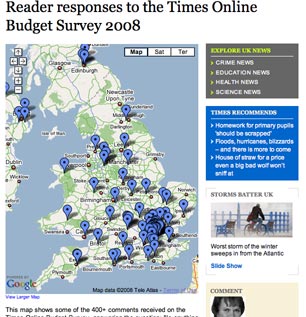This post is Journalism.co.uk’s contribution to the Carnival of Journalism, which is being hosted by Scribblesheet.
So much has happened in the last 12-months in the online news area we thought it was about time to focus a little attention on some of the projects and processes looking to drive the next step of innovative ways of getting news to the public.
Quite simply, we just want to draw attention to two development projects – one either side of the Atlantic – which aim to meld journalism and technology and find new and unique ways of engaging an audience.
It’s no surprise that both these projects are being run by – or in conjunction with – forward thinking academic institutions.
The UK project is, appropriately enough, called Meld. It’s being run this week by UCLAN department of journalism, under the watchful eye of fellow contributor to the Carnival Andy Dickinson.
Teams of of journalists, creative technologists/interaction designers volunteered to be brought together for a week of hot-housing ideas which would then be pitched to industry partners – Sky News, Johnston Press (JP) and Haymarket Media.
Each partner set a slightly different brief for the teams:
Sky News wants to ‘grow its unique users and page impressions (especially unique users) by offering a variety of original news related content’.
JP wants to ‘enhance our relationship with our readers and expand the local audience for our range of news and data websites.
While Haymarket wanted a rich media offering to serve a traveling baby boomer audience, something that appealed to a new men’s market or a Web 3.0 offering to blend ‘source and social’.
Based on these briefs, the industry bods provide feedback on the ideas – IP developed at the workshop is owned by the teams, each of which would be expected to negotiate their own terms should any commercial relationship develop with the industry partners.
The project is about pure innovation, trying to develop great ideas that benefit the industry and consumer, not innovation cosseted by the sometimes limiting effect of industry-led development where cost worries often cut innovation and failure of a single idea can be seen as failure of innovation, per se.
This snippet of Matt Marsh (taken from the Meld Blog) sums up the spirit of innovative thinking bursting over at the project.
[youtube:http://www.youtube.com/watch?v=FKxGbbGEO7c]
The second project is similar, it’s a project being run as part of the graduate programme at CUNY, this time under the eye of Jeff Jarvis (Jeff has already documented part of the process).
Students on the first wave of the entrepreneurial journalism course spent last week pitching their ideas to a dozen jurors drawn from New York’s stellar media community.
A five minute pitch followed by seven minutes of questions from the jurors offered the chance to walk away with as much as $45,000 seed much for an innovative journalism project.
The course was set up with a $100,000, two-year grant from the McCormick Tribune Foundation.
The students developed projects including a hyper-local site for a Brooklyn neighbourhood, innovative uses of Ning to create specialist social networks, blog search engines using Google’s custom search technology and several project – personal finance for young people, a service to match school athletes with colleges – that questioned weather they could survive just for Facebook (Judge Saul Hansell has posted a fairly full piece about the nature of the individual projects).
A few project were awarded grants from the jurors to develop their ideas further, notably a project to get the public angle on what follow up stories reporters should follow.
The overriding importance of this and the Meld project is that it gives the opportunity to develop left-field ideas which get inside the mind of those that would benefit by using it, rather than just owning it.
These ideas aren’t just providing the next cash cows for big media, they are writing a new language for journalism, creating new platforms for the principles of good practice to be carried forward into this new century.
That is both novel and revolutionary.

